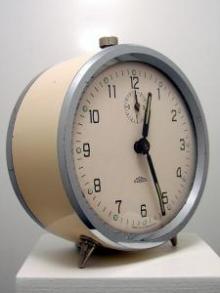
Recently Rated:
Stats
Spring Forward in Most US States
I grew up in Arizona--one of a few states that had the good sense to avoid the hassle of Daylight Savings Time. Not sure who 'they' think they're fooling. I know it was originally meant to help out the farmers, but, come on! We aren't exactly an agrarian country anymore! Anyway, here's what you may need to know:
Daylight savings time is almost here. Yes, much of the nation switches over to daylight savings time at 2 a.m. Sunday. Most states spring forward an hour with the exception of Arizona, Hawaii, Puerto Rico and territories such as Guam, American Samoa, the Virgin Islands and Northern Marianas Islands.
That makes many people happy -- or, rather, they think it does. Sure, folks can enjoy a bit of lingering daylight before turning on the TV after dinner. But some research suggests the time change may not be all its cracked up to be. It might just might, were not saying it does increase your risk of having a heart attack or attempting suicide.
More to the issue perhaps is that the mornings will be darker. L.A. Times staff writer Shari Roan examined the effect of this a few years ago when the time change was moved ahead by three weeks.
She wrote: "Early morning light sets the body's clock to gear up for the day's activities, but the later sunrise in the winter -- and a society based on the clock instead of nature -- causes a delay in the normal cycle."
Roenneberg said, The consequence of that is that the majority of the population has drastically decreased productivity, decreased quality of life, increasing susceptibility to illness, and is just plain tired. He refers to the chronically overtired people in the developed world as suffering from social jet lag.
He further stated, Light doesn't do the same things to the body in the morning and the evening. More light in the morning would advance the body clock, and that would be good. But more light in the evening would even further delay the body clock.On ther other hand, National Geographic reports Hendrik Wolff of the University of Washington co-authored a paper about daylight saving time power-use data. He is also studying whether daylight saving time gives health a boost because of more active lifestyles.
Wolff said, in a nationwide American time-use study, we're clearly seeing that, at the time of daylight saving time extension in the spring, television watching is substantially reduced and outdoor behaviors like jogging, walking, or going to the park are substantially increased. That's remarkable, because of course the total amount of daylight in a given day is the same." Evidently 'they' are fooling some people!
The University of Connecticut Health Center offers these tips for managing your sleep and life this weekend and the rest of the year.
--Practice. In the days leading up to the change, go to bed 15 minutes earlier and wake up 15 minutes earlier.(Too late!)
--Take a nap on Saturday but not close to bedtime.
--Just do it. After the time change, go to bed at your usual time even if you dont feel sleepy. Youll get used to it.
Suggestions to offset possible health effects of daylight savings time include getting early morning sunlight on the weekend to help coordinate your circadian rhythm. Lewy indicated it meant getting up at dawn for direct sunlight and not just sleeping by a window, something many people might be reluctant to try on a Saturday or Sunday morning.Avoiding evening light during those longer days can also help your body clock adjust. Another option is taking melatonin, a hormone our body produces at night that helps activate our body clock. Lewy said, A melatonin pill can stimulate those same receptors. And if you take it during the day, you can trick the neurons into thinking it's night and shift the clock.
Gehrman also suggested keeping a regular schedule including meal times. Other options include minimizing caffeine consumption during the day and avoiding exercise right before bed. Gerhman explains, You really need an hour of wind-down time, before going to bed.
Daylight saving time 2011 will be around for awhile so people are sure to get used to it. This weekend we will spring forward an hour. Standard time will be back on Sunday, November 6, 2011 when we once again fall behind an hour.
Here's a link to see how the rest of the world does (or doesn't) do it: http://www.webexhibits.org/daylightsaving/g.html

